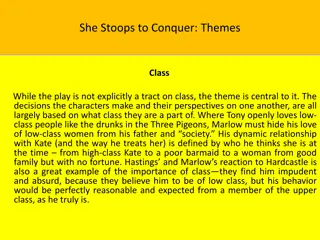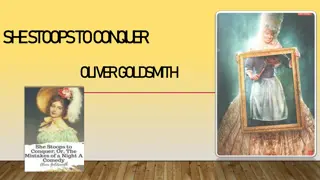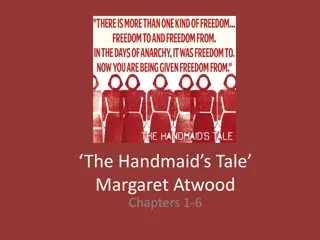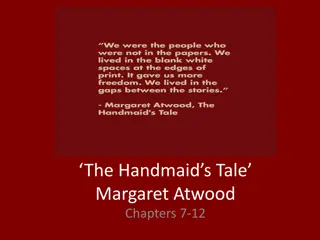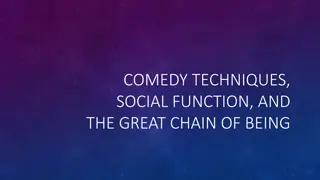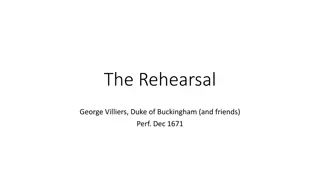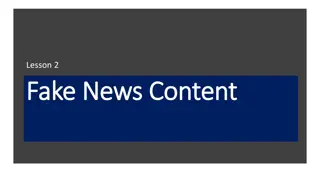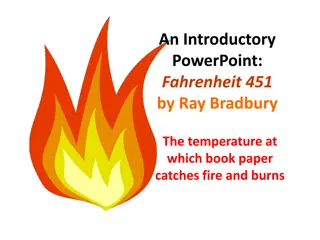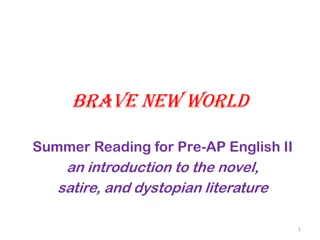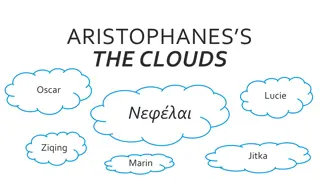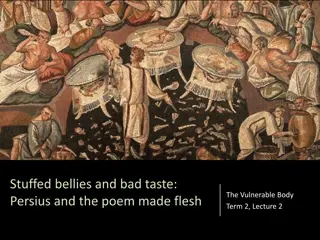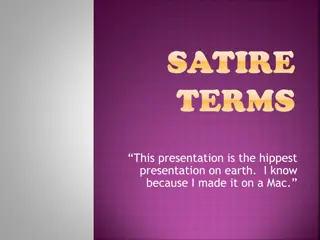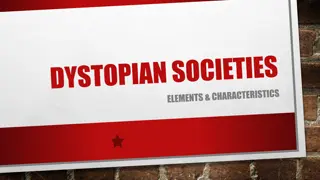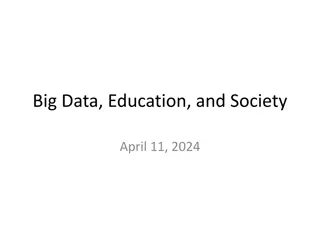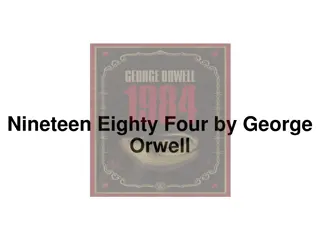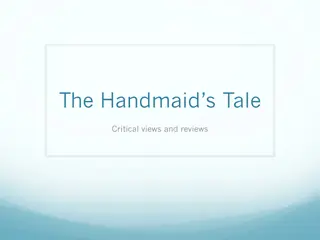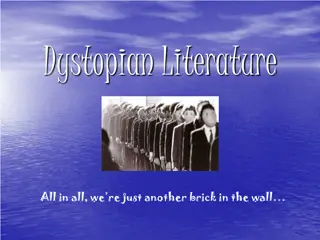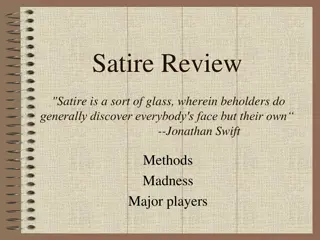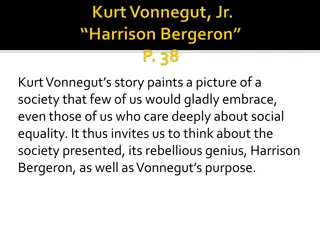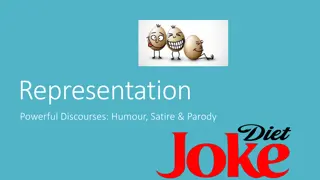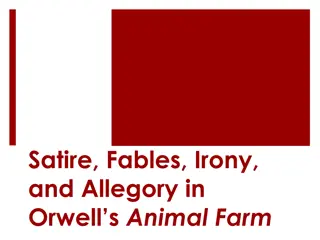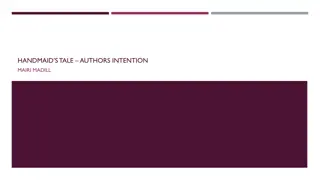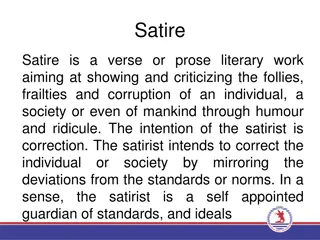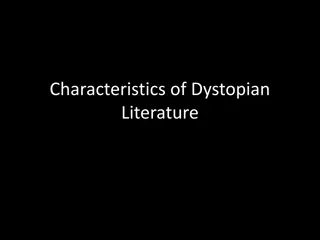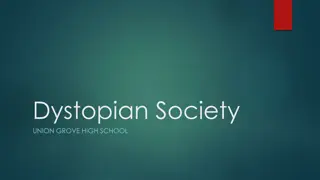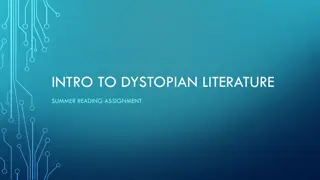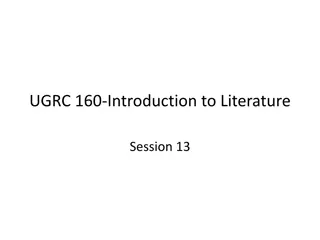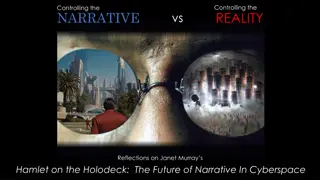Themes Explored in "She Stoops to Conquer
The play "She Stoops to Conquer" delves into themes of class, money, behavior/appearance, and moderation. Class distinctions shape character interactions, while money influences decisions and relationships. The satire on aristocratic behavior highlights misconceptions based on appearances. The confl
0 views • 15 slides
Exploring 'She Stoops to Conquer': A Classic Restoration Era Comedy
Discover the enduring charm of Goldsmith's play 'She Stoops to Conquer,' blending comedy and satire in a lively tale of mistaken identities and romantic pursuits. Uncover the tricks, wit, and humor that have made this play a beloved comedic masterpiece in English literary history.
0 views • 13 slides
Understanding Dystopian Societies in 1984 Novel Guide
Explore the themes of utopia and dystopia in George Orwell's 1984 novel through a comprehensive guide. Learn about the characteristics of dystopian societies, types of controls, and the role of protagonists in challenging oppressive systems. Dive into the discussions on propaganda, surveillance, deh
0 views • 10 slides
Insights into "The Handmaid's Tale" Chapters 1-6 Analysis
Within the first six chapters of "The Handmaid's Tale" by Margaret Atwood, we are introduced to the narrator, Offred, and gain a detailed understanding of the life and role of a Handmaid in the dystopian society of Gilead. Key quotes and epigraphs shed light on the themes of fertility, desperation,
0 views • 20 slides
Understanding Offred's Journey in "The Handmaid's Tale" through Chapters 7-12
Offred's experiences in chapters 7-12 of "The Handmaid's Tale" reveal the depth of her depersonalization and loss of identity in the dystopian society of Gilead. Through key quotes, we delve into Offred's reflections on her body and the control imposed upon her, shedding light on her feelings toward
0 views • 12 slides
Comedy Techniques, Social Function, and The Great Chain of Being
Explore the world of comedy, from slapstick and farce to parody and satire. Learn about techniques like dramatic irony and gallows humor that add depth to comedic genres. Discover how the Great Chain of Being shaped Elizabethan beliefs about social order and divine right. From God and angels to tree
0 views • 6 slides
The Rehearsal and The Antagonists: Satire in Restoration Drama
The Duke of Buckingham's satirical play "The Rehearsal" marked a significant shift in Restoration drama by mocking contemporary heroic plays and literary figures like John Dryden. The play, first performed in 1671, achieved popularity and influenced a tradition of dramatic burlesque on the English s
1 views • 8 slides
Understanding the Different Types of Misinformation and Fake News
Explore the various forms of misinformation such as fake news, satire, fabrication, manipulation, propaganda, and dissemination. Learn how fake news impacts public perception and how it can mislead individuals. Discover the prevalence of fake news and its effects on society.
2 views • 11 slides
Insights into Fahrenheit 451 by Ray Bradbury
Explore the influential novel Fahrenheit 451 by Ray Bradbury, delving into its origins, themes, and relevance in the context of societal criticism, dystopian elements, and historical backdrop of the 1950s. Discover the cautionary tale of censorship, technological advancements, and the impact of tota
0 views • 16 slides
Understanding Satire: Elements and Examples in Shrek (2001)
Satire, through elements like exaggeration, incongruity, reversal, and parody, is used in the movie Shrek (2001) to mock traditional fairy tale tropes. The character Princess Fiona's unconventional fighting style and role reversal as the hero challenge typical narrative expectations. By analyzing sp
1 views • 9 slides
Unveiling the World of Comedy: An In-Depth Exploration
Embark on a journey through the diverse realms of comedy and humor, discovering the art of satire, parody, puns, and more. Learn to decipher the nuances of hyperbole, sarcasm, and slapstick comedy, and delve into the world of stereotypes and situational irony. Unleash your inner comedian, impress yo
1 views • 12 slides
Sredni Vashtar: A Captivating Tale by H.H. Munro (Saki)
Sredni Vashtar is a story written by the renowned British author H.H. Munro, popularly known as Saki. The tale, filled with wit and satire, delves into the themes of freedom and power as it follows the unconventional relationship between a young boy named Conradin and his secret and vengeful god, Sr
1 views • 28 slides
Exploring "Brave New World": An Introduction to Dystopian Satire
This guide provides an overview of Aldous Huxley's "Brave New World," discussing its themes of propaganda, censorship, conformity, genetic engineering, and social conditioning. Delve into the novel's depiction of a controlled society, the use of technology, consumerism, and the satire employed to cr
1 views • 15 slides
Aristophanes: Master of Ancient Greek Comedy and Satire
Aristophanes, a prominent figure in ancient Greek comedy, wrote 40 plays with only 11 surviving to this day. His play "The Clouds" criticized contemporary politics and education, even portraying Socrates unfairly. Despite facing challenges during his time, Aristophanes's works continue to be appreci
1 views • 6 slides
Exploring Roman Verse Satire Through Bodies: Horace and Persius
Delve into the representation and treatment of bodies in Roman verse satire through the works of Horace and Persius. Analyze how these poets intertwine physical vulnerabilities, personal histories, and societal critique within their satirical compositions. Discover the power of vulnerability in sati
0 views • 14 slides
Analyzing Satire and Character Development in "The Importance of Being Earnest
Explore how Oscar Wilde uses humor, satire, and wit to develop characters like Jack and Algernon in "The Importance of Being Earnest." Dive into the clever use of cucumber sandwiches, the creation of false identities, and the ridiculing of British aristocracy to unravel the layers of social commenta
0 views • 12 slides
The Role of Humour in Ovid's Ars Amatoria: A Literary Analysis
Explore how humour is central to Ovid's works, challenging traditional norms and beliefs through satire and comedy. Delve into the significance of literary devices, language choice, and mythology in conveying Ovid's message to his audience. Unpack the themes of mockery, self-awareness, and social cr
0 views • 13 slides
The Rich History of Argentine Comics: From Golden Age to Modern Times
Argentina boasts a rich tradition of comics, with iconic figures and writers comparable to those of New York and Paris. The development of comics in Argentina can be traced back to the 19th century, evolving from single-panel political satire to magazine and newspaper formats. The Golden Age of Arge
0 views • 16 slides
Unveiling Satire in Gulliver's Travels
Jonathan Swift's Gulliver's Travels is not just a travel log but a work of satire that cleverly critiques social issues and human weaknesses through the adventures of Lemuel Gulliver. Swift's use of exaggeration and irony in Gulliver's encounters with various societies reflects the satirical underto
0 views • 8 slides
Unveiling the Art of Satire: Types and Techniques
Delve into the world of satire with this presentation exploring the types of satire such as Juvenalian and Horatian, along with elements like hyperbole, incongruity, and reversal. Discover how satire is used as a literary technique to mock human vices and learn about the humor and criticism it conve
0 views • 15 slides
Understanding Utopia and Dystopia in Literature and History
Explore the concepts of Utopia and Dystopia, with a focus on their definitions, examples, and the role of dystopian literature in critiquing societal norms and systems. Discover the historical circumstances that have influenced the flourishing of dystopian fiction, along with the various types of dy
0 views • 11 slides
Exploring Big Data's Impact on Education And Society
This presentation delves into the intersection of big data, education, and society, highlighting the risks and challenges involved. It also discusses privacy issues and the perception of malevolence in data collection. Examining a research trial involving Galvanic Skin Response bracelets in classroo
0 views • 44 slides
Insights into George Orwell's Nineteen Eighty-Four and Totalitarian Regimes
George Orwell's novel Nineteen Eighty-Four explores themes of oppression, totalitarianism, and political satire inspired by the oppressive regimes of Nazi Germany and Soviet Russia. The story delves into a dystopian society controlled by the Party, led by figures like Big Brother, reflecting Orwell'
1 views • 25 slides
Critical Views and Reviews of "The Handmaid's Tale" Through Feminist and Utopian Perspectives
The critical exploration of "The Handmaid's Tale" delves into themes of feminism, utopianism, and dystopian dangers. It discusses the portrayal of education, the impact of digitization, and the feminist utopias created by Margaret Atwood. The novel is commended for its reflection of societal issues
0 views • 21 slides
Understanding Dystopian Societies: A Comprehensive Overview
Explore the intricate realms of dystopian literature, delving into the contrasting notions of utopia and dystopia. Uncover the defining characteristics of dystopian societies, from oppressive controls to societal illusions. Dive into the various types of dystopian controls, including corporate, bure
0 views • 25 slides
Exploring the Art of Satire in Literature
Delve into the world of satire, a literary device that combines humor and criticism to target human flaws and societal issues. Uncover the origins, major types, and key devices used in satire, as well as its significance in critiquing and improving human institutions and behaviors. Understand how sa
0 views • 24 slides
Exploring Themes in Kurt Vonnegut's "Harrison Bergeron
Kurt Vonnegut's story "Harrison Bergeron" presents a dystopian society obsessed with enforced equality. Through the rebellious character of Harrison and thought-provoking narrative, Vonnegut challenges readers to reflect on the consequences of extreme sameness and the value of individuality, freedom
0 views • 8 slides
The World of Restoration Comedy: Satire and Society in 17th Century London
The Restoration era saw the rise of Comedy of Manners, reflecting the upper class lifestyle with wit and satire. Playwrights like William Wycherley and William Congreve crafted plays that critiqued societal norms, focusing on themes of love, marriage, and social conduct in London. The plays feature
0 views • 4 slides
Exploring Humour, Satire, and Parody in Powerful Discourses
Delve into the definitions of humour, satire, and parody, and examine how these elements are utilized in powerful discourses. Compare speech features in speeches by Emmeline Pankhurst and a chocolate biscuit, and explore the different representations of humour in spoken and written texts. Discover h
0 views • 10 slides
Understanding Satire, Fables, Irony, and Allegory in Orwell's Animal Farm
Satire, fables, irony, and allegory play crucial roles in literature like Orwell's Animal Farm. Satire ridicules societal vices, fables convey morals through stories, irony provides contradiction, and allegory deepens meanings. Through examples and explanations, these literary devices are explored a
0 views • 16 slides
Feminism in "The Handmaid's Tale": Exploring Authorial Intentions
Despite Margaret Atwood's denial of writing "The Handmaid's Tale" as a feminist piece, the novel inherently explores feminist themes through the portrayal of women's oppression and control in a dystopian society. The text delves into the objectification of women, their limited autonomy, and the supp
0 views • 8 slides
Understanding Satire in Literature
Satire is a form of literary work that uses humor and ridicule to criticize the flaws and corruption of individuals or society. Through Horatian or Juvenalian styles, satirists aim to correct deviations from norms by mirroring societal standards and ideals. Notable examples include Geoffrey Chaucer'
0 views • 5 slides
Understanding Dystopian Literature: Key Characteristics and Examples
Explore the characteristics of dystopian literature, including societal control, propaganda, surveillance, dehumanization, and the worship of figures or concepts. Learn how dystopias critique current trends and political systems through imagined oppressive worlds. Discover examples from popular dyst
0 views • 17 slides
Understanding Dystopian Societies and Controls
Dystopian societies, like Union Grove High School, exaggerate worst-case scenarios to criticize current trends or systems. Characteristics include propaganda, restricted freedom, and banished natural world. Types of control include corporate, bureaucratic, technological, philosophical, or religious.
0 views • 11 slides
Exploring Dystopian Worlds in Literature
Marrow Thieves presents a dystopian universe where societal control is oppressive. Dystopias criticize current trends by exaggerating worst-case scenarios. Characteristics include propaganda, limited freedom, and dehumanization. Types of control range from corporate to technological. Dystopian prota
0 views • 15 slides
Introduction to Dystopian Literature: Summer Reading Exploration
Explore the origins of utopia and its transition to dystopia in American society through a critical analysis of dystopian characteristics and control mechanisms. Discover how propaganda, surveillance, and societal oppression are depicted in dystopian literature, challenging readers to question socie
0 views • 9 slides
Literary Elements Overview: Understanding Style, Symbolism, Satire, and More
Style in literature, symbolizing deeper meanings, and techniques like satire and metaphor are vital literary elements. Explore how authors utilize these tools to enhance their works, creating engaging narratives with rich character development and compelling plots.
0 views • 10 slides
Privacy Concerns Surrounding Galvanic Skin Response Bracelets in Education
The use of Galvanic Skin Response (GSR) bracelets in classrooms to measure physiological engagement has raised privacy concerns. Critics fear a dystopian future where students and teachers are monitored and controlled through electronic devices, leading to questions about common sense, funding sourc
1 views • 35 slides
Evolution of Science Fiction Literature
Science fiction genre, blending imaginative fantasy with scientific principles, has evolved significantly over time. Initially emerging in the late 1800s, it gained popularity alongside technological advancements. Theodore Sturgeon highlighted the essence of human stories within the genre. Iconic wo
0 views • 8 slides
Exploring Janet Murray's Vision of Narrative Evolution in Cyberspace
Janet Murray's book "Hamlet on the Holodeck: The Future of Narrative In Cyberspace" delves into the shift towards interactive storytelling in modern media like video games and Virtual Reality. She emphasizes the role of interactivity, immersion, and freedom in shaping narratives, offering a new form
0 views • 16 slides
